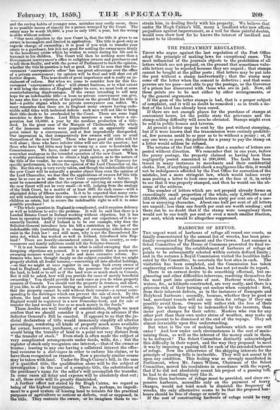THE PREPAYMENT REGULATION.
THOSE who argue against the last regulation of the Post Office adopt the principle of making laws for exceptional eases. The most influential of the journals objects to the prohibition of all letters which are not prepaid, on the ground that sometimes valu- able letters may be rejected because they are unpaid ; that stamps cannot be bought at the pillar posts ; that letters may be put into the post without a stamp inadvertently ; that the stamp may come off the letter when the cement is defective ; and that some persons are too poor—not able to pay the postage, as the Governor of a prison has discovered with those who are in jail. Now, all these points are to be met either by other arrangements, or by the general arguments.
If the gum of the letter stamps is bad, that is a proper subject of complaint, and it will no doubt be remedied ; as in truth a de- fect of the kind has already been cured. If there are not enough places for the purchase of stamps at convenient hours, let the public state the grievance and the stamp-selling difficulty will soon be obviated. Stamps might even be sold in public houses and taverns.
At present a letter may be sent by the post without stamping, but if it were known that the transmission were entirely prohibit- ed, few persona could be so poor as to be without a penny ; or, if any one were so poor, the petition for a penny to pay the stamp on a letter would seldom be refused.
The returns of the Post Office show that a number of letters are posted without direction. We remember that in one year, before the penny postage, the property claimed as having been thus negligently posted amounted to 200,0001. The fault has been traced in many instances to merchants and their confidential clerks. Now, if anything could check a negligence like this, it would not be indulgences afforded by the Post Office for correction of the mistake, but a more stringent law, which would induce every man posting a letter to look once more at the face of it, in order to see that it was properly stamped, and then he would see the ab- sence of the address.
The number of letters which are not prepaid already forms an exceedingly small proportion of the whole, only 2,600,000 out of 523,000,000, and of the unpaid letters sixty per cent are of a use- less or annoying character. About one half per cent of all letters are unpaid; less than one fourth per cent are worth sending ; and there can be no doubt that if the stamp were compulsory there would not be one tenth per cent or even a much smaller fraction, per cent, which would be altogether suppressed.


























 Previous page
Previous page